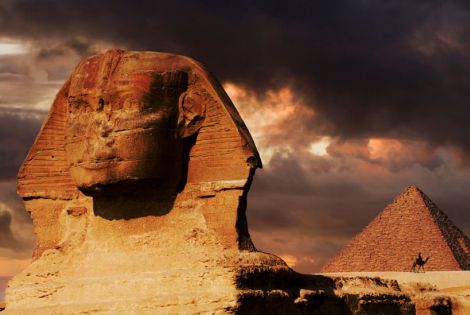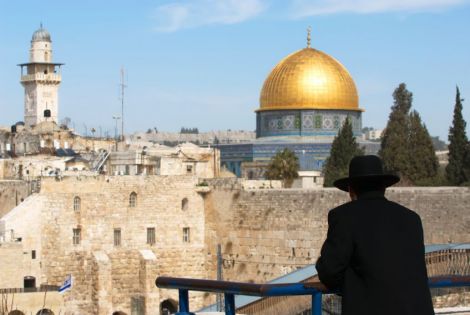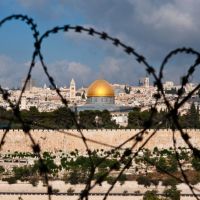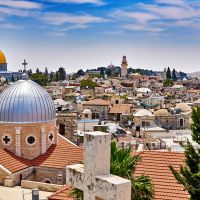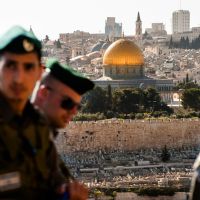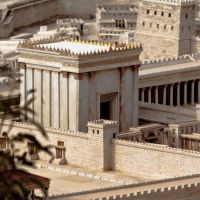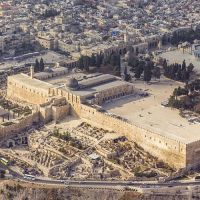“By the mid-20th century a common definition of the Middle East encompassed the states or territories of Turkey, Cyprus, Syria, Lebanon, Iraq, Iran, Israel, the West Bank, the Gaza Strip, Jordan, Egypt, Sudan, Libya, and the various states and territories of Arabia proper (Saudi Arabia, Kuwait, Yemen, Oman, Bahrain, Qatar, and the Trucial States, or Trucial Oman [now United Arab Emirates]).
An area of the world called the Middle East is often in the news, as Arab countries and the State of Israel continually spar over territory and national legitimacy. Both sides make historical claims on the land, and multiple efforts to make peace have languished. Where exactly is the Middle East? What does the Bible say about this volatile part of the world?
Where is the Middle East located?
The Middle East encompasses the lands around the southern and eastern shores of the Mediterranean Sea. Although primarily located in western Asia, it is a transcontinental region because portions of its territory are also found in northern Africa and a tiny part of southeastern Europe.
This area also includes what is sometimes referred to as the Levant. This term “refers to the area of the rising of the sun, from the perspective of the western Mediterranean. The Levant is the eastern Mediterranean area now covered by Israel, Lebanon, part of Syria, and western Jordan. In antiquity, the southern part of the Levant or Palestine was called Canaan” (thoughtco.com).
Middle East countries
Although the exact boundaries of this region have varied, the Encyclopaedia Britannica states:
“Subsequent events have tended, in loose usage, to enlarge the number of lands included in the definition. The three North African countries of Tunisia, Algeria, and Morocco are closely connected in sentiment and foreign policy with the Arab states. In addition, geographic factors often require statesmen and others to take account of Afghanistan and Pakistan in connection with the affairs of the Middle East” (“Middle East”).
Middle Eastern ethnicity
Arabs are the majority ethnic group in this part of the world. Thirteen of the countries in this region are part of the Arab League. This league “is a loose confederation of twenty-two Arab nations whose broad mission is to improve coordination among its members on matters of common interest. The league was chartered in response to concerns about postwar colonial divisions of territory as well as strong opposition to the emergence of a Jewish state on Palestinian territory” (cfr.org/backgrounder/arab-league).
But what many people do not realize is that Arabs and Jews are related. Both trace their lineage back to Abraham.
Why is the Middle East important to us?
The Middle East is widely recognized as the cradle of civilization. The Garden of Eden, where God placed the first man and woman, may have been in southern Mesopotamia (modern Iraq) near the Tigris and Euphrates Rivers (Genesis 2:14).
Following the great universal flood that came upon the world, the ark that protected Noah and his family came to rest “on the mountains of Ararat” (Genesis 8:4). These mountains are found in modern Turkey.
A large portion of the Middle East is sometimes referred to as the Promised Land because much of it was promised by God to Abraham and his descendants (Genesis 15:18-21). This was where the ancient nation of Israel, including its capital city of Jerusalem, was located.
The Middle East is where the Old Testament was inspired by God to be written and the home of its prophets. It is also where Jesus conducted His ministry and where Muhammad, the founder of Islam, lived and died.
With so much history, it is easy to understand why Judaism, Christianity and Islam all have their origins in this region. For further explanation of the religious complexities in the Middle East, see the article “Jerusalem: Why Three Major Religions Claim It.”
Why is there so much conflict in the Middle East?
Many people today don’t understand that the tensions between the Jews and the Arab countries in the Middle East are a long-simmering family feud. The rift began long ago, when Abram (later called Abraham, Genesis 17:5) began raising his family.
Initially unable to have children with his wife Sarai (later called Sarah, Genesis 17:15), Abraham decided to follow a custom that had developed at that time in order to produce an heir. At the urging of his wife, Abraham fathered a child through Hagar, his wife’s Egyptian handmaid (Genesis 16:1-2).
Shortly after Hagar conceived, tensions between Sarah and Hagar boiled over. “And when she [Hagar] saw that she had conceived, her mistress [Sarah] became despised in her eyes” (verse 4).
After Sarah confronted him about the issue, Abraham gave his wife permission to deal with Hagar as she pleased. “And when Sarai dealt harshly with her, she fled from her presence” (verse 6).
Then God told Hagar to return to her mistress and that she would bear a son who should be called Ishmael.
After her son’s birth, Hagar and Ishmael remained with Abraham and Sarah. God then appeared to Abraham and told him that he would bear a son through his wife Sarah. Fourteen years after Ishmael’s birth, Isaac was born (Genesis 16:16; 21:5).
On the day Isaac was weaned, “Abraham made a great feast” (Genesis 21:8). The joyous occasion was soon marred with tension between Sarah and her handmaid.
“Sarah saw the son of Hagar the Egyptian, whom she had borne to Abraham, scoffing. Therefore she said to Abraham, ‘Cast out this bondwoman and her son; for the son of this bondwoman shall not be heir with my son, namely with Isaac’” (verses 9-10).
Abraham was in a difficult position. He did not want to send Ishmael away. But with the admonition from God to listen to Sarah and with assurance from God that Ishmael’s descendants would also become a nation, Abraham did so (verses 11-14).
Even though Isaac received Abraham’s wealth (Genesis 25:5), God also blessed Ishmael. The child of Hagar and Abraham had 12 sons, who each fathered nations (verses 12-16) just as God had previously said (Genesis 17:20). Ishmael’s descendants are the Arab peoples today.
From this rocky start in a household with two mothers, jealousies and rivalries have continued through the ages between Ishmael’s descendants (the Arabs) and the descendants of Isaac’s grandson Judah (the Jews). For additional information on these rivalries, see the article “Culture Wars.”
And see also our article “Anti-Semitism” about the prejudice and hatred Jewish people have experienced in many places over the centuries.
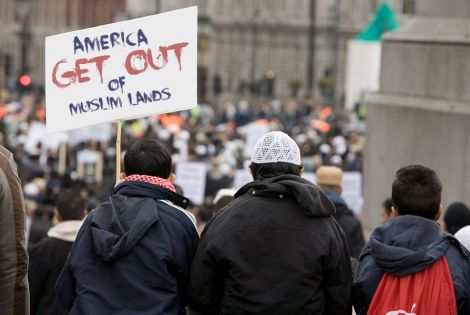
Culture Wars
History shows that cultures inevitably clash, but why are radical Muslims so angry at the United States? How will this world ever find peace?

Anti-Semitism
Anti-Semitism has existed in every generation and everywhere the Jews have lived. Why has there been such universal hatred of the Jews? Will it ever end?
Modern conflict in the Middle East
The Ottoman Empire ruled the Middle East for 400 years, but following its collapse in 1918 at the end of World War I, a number of new nations were created. Most of these were Arabic-speaking, and this development led to the modern Arab world today.
In 1948 the State of Israel came into existence. The Jewish people, who had been seeking a homeland in the Middle East for hundreds of years, finally again had their own nation.
Here is how History.com speaks of this day in history: “On May 14, 1948, in Tel Aviv, Jewish Agency Chairman David Ben-Gurion proclaims the State of Israel, establishing the first Jewish state in 2,000 years. Ben-Gurion became Israel’s first premier.
“In the distance, the rumble of guns could be heard from fighting that broke out between Jews and Arabs immediately following the British army withdrawal earlier that day. Egypt launched an air assault against Israel that evening.
“Despite a blackout in Tel Aviv—and the expected Arab invasion—Jews joyously celebrated the birth of their new nation, especially after word was received that the United States had recognized the Jewish state. At midnight, the State of Israel officially came into being upon termination of the British mandate in Palestine.”
The emergence of a Jewish nation thus began in a cauldron of hostility. Israel’s neighboring nations tried to destroy the infant nation at its inception. To this day, some Arab nations continue to speak of their hope and dream of totally destroying Israel.
To learn more about how the Bible predicted the establishment of a Jewish nation, see the article “Middle East Conflict.”
Jerusalem: focal point of conflict
Biblical history is not the only reason that the Middle East is important to us. This region is also the focal point of future Bible prophecy. There are prophecies relating to other parts of the earth, but the Middle East—and especially Jerusalem—is central to God’s plan.
What many do not understand is that Jerusalem is special to God. Of all the places on earth, God has a special love for this city. As He said through the prophet Ahijah during the time of Solomon, Jerusalem is “the city which I have chosen for Myself, to put My name there” (1 Kings 11:36). It is the city where God said, “I will put My name forever” (2 Chronicles 33:7).
Jerusalem is where Jesus spent much of His ministry and where He died. The nearby Mount of Olives is the location to which He will return. Speaking of this monumental event, Zechariah prophesied: “And in that day [of His return] His feet will stand on the Mount of Olives” (Zechariah 14:4).
The Mount of Olives is the place from which Jesus ascended into heaven after appearing for multiple days to His disciples following His resurrection (Acts 1:9, 12). Those watching this event heard two men in white apparel (most likely angels) say, “This same Jesus, who was taken up from you into heaven, will so come in like manner as you saw Him go into heaven” (verses 10-11).
When Jesus returns, Jerusalem is not going to be a city at peace, ready to welcome mankind’s Savior. Instead, it is going to be the center of conflict where “all the nations” will be gathered “to battle against Jerusalem” (Zechariah 14:2).
While many have tried to broker peace for this ancient city and neighboring nations in recent years, there has been no breakthrough. Negotiations remain mired in intractability just as the Bible predicted.
As God said through the prophet Zechariah: “Behold, I will make Jerusalem a cup of drunkenness to all the surrounding peoples. … I will make Jerusalem a very heavy stone for all peoples” (Zechariah 12:2-3).
This conflict will be the culmination of Christ’s prophecy of an end-time event described as “great tribulation.” Addressing this time, Jesus explained: “For then there will be great tribulation, such as has not been since the beginning of the world until this time, no, nor ever shall be. And unless those days were shortened, no flesh would be saved” (Matthew 24:21-22).
Thankfully, Jesus will intervene to save humanity from itself. Christ will return and defeat all who fight against Him (Revelation 19:11-21). For additional perspective on the city of Jerusalem, see “Jerusalem in Prophecy” and related articles.
Additional articles in this section explore the history of the Temple Mount and how prophecy regarding another temple may be fulfilled.
Jerusalem: capital city of the King of Kings
After Jesus puts down all who fight against Him at His return, He is going to establish the Kingdom of God here on earth. The Bible reveals that Jerusalem will be His capital city, and God’s laws and justice will flow out from it.
The gospel (good news) of the coming Kingdom of God is the message Jesus came preaching (Mark 1:14; Matthew 4:23; 24:14). When this Kingdom is established, Jesus will rule over the entire earth as “KING OF KINGS AND LORD OF LORDS” (Revelation 19:16).
Jesus is prophesied to rule over this Kingdom. During the first 1,000 years, the earth will become abundantly productive, nations will be at peace, and all humans will have the opportunity to understand and accept God’s way of life, which will lead to eternal life as members of God’s family.
Here is how the prophet Isaiah describes this coming Kingdom: “Now it shall come to pass in the latter days that the mountain of the LORD’s house shall be established on the top of the mountains, and shall be exalted above the hills; and all nations shall flow to it.
“Many people shall come and say, ‘Come, and let us go up to the mountain of the LORD, to the house of the God of Jacob; He will teach us His ways, and we shall walk in His paths.’ For out of Zion shall go forth the law, and the word of the LORD from Jerusalem.
“He shall judge between the nations, and rebuke many people; they shall beat their swords into plowshares, and their spears into pruning hooks; nation shall not lift up sword against nation, neither shall they learn war anymore” (Isaiah 2:2-4).
Today the Middle East remains a flash point for regional and global conflict. But what an awesome future God has in store for this special land!

Peace in the Middle East
Peace is eventually going to come to this troubled region of the earth but not in the way many expect. What does the Bible say about peace in the Middle East?

